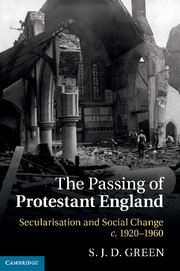Book contents
- Frontmatter
- Contents
- Acknowledgements
- Part I Outline of the problem
- Part II Disclosures of decline
- 3 The ‘soul of England’ in an ‘age of disintegration’: Dean Inge and the ‘trial of the churches’ in the wake of World War I
- 4 The strange death of puritan England
- 5 Social science and the discovery of a ‘post-protestant people’: Rowntree's surveys of York and their other legacy
- Part III Resistance, revival and resignation
- Conclusion: the passing of protestant England
- Index
- References
5 - Social science and the discovery of a ‘post-protestant people’: Rowntree's surveys of York and their other legacy
Published online by Cambridge University Press: 10 January 2011
- Frontmatter
- Contents
- Acknowledgements
- Part I Outline of the problem
- Part II Disclosures of decline
- 3 The ‘soul of England’ in an ‘age of disintegration’: Dean Inge and the ‘trial of the churches’ in the wake of World War I
- 4 The strange death of puritan England
- 5 Social science and the discovery of a ‘post-protestant people’: Rowntree's surveys of York and their other legacy
- Part III Resistance, revival and resignation
- Conclusion: the passing of protestant England
- Index
- References
Summary
Writing to his granddaughter, Miss Greta von Kulnett in July 1951, Benjamin Seebohm Rowntree – world famous businessman, celebrated philanthropist and pioneering sociologist – confessed to having recently experienced a certain uncharacteristic ‘excitement’ at the veritable ‘stir’ his latest book had ‘created in England’. He was not exaggerating. Earlier that summer, one newspaper had described English Life and Leisure: a Social Study as the equivalent of ‘social dynamite’. Other organs of opinion also acknowledged its immediate importance. Some, he noted, had done so only by ‘attack[ing] it heavily’. But the majority had judged its merits quite ‘favourably’. And there had been very good news in the shops. A first run of 7,500 copies ‘sold [out] very quickly’. In fact, it was gone within a few weeks of the book's initial publication. Postwar paper shortages ensured that interim permission was granted for only another 2,000 volumes at Longman's first bidding. But a further imprint, of up to 5,000 volumes, was planned as quickly as economic considerations allowed. In the event, sales of English Life and Leisure topped 10,000 by the end of the year.
No wonder young Miss Greta expressed as much surprise as delight in her dutiful reply. For what Rowntree was describing was the commercial and (as he saw it) critical success of a far from obviously sensational exercise in social scientific investigation. English Life and Leisure was certainly a handsome product.
- Type
- Chapter
- Information
- The Passing of Protestant EnglandSecularisation and Social Change, c.1920–1960, pp. 180 - 208Publisher: Cambridge University PressPrint publication year: 2010



